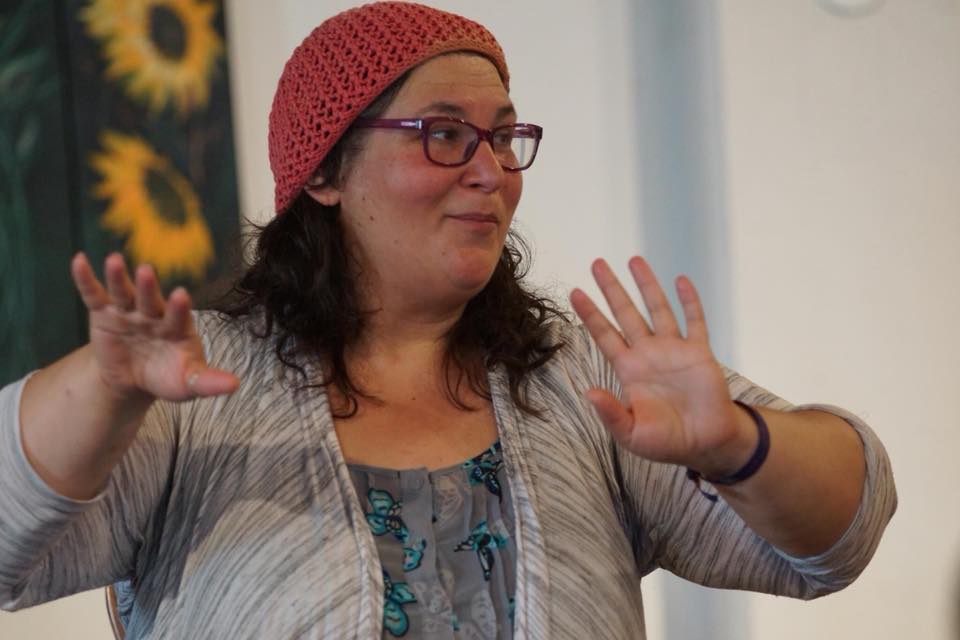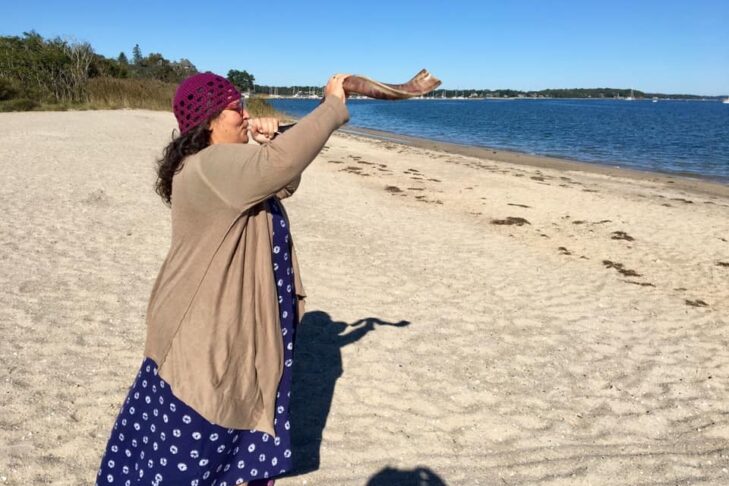On the homepage of her website, FatTorah.com, Rabbi Minna Bromberg, founder and president, declares that her intention to destigmatize weight and body image issues is about “smashing the idolatry of fat phobia and leading ourselves from narrowness to freedom.” Bromberg sheds light on fat phobia by also addressing “other systems of oppression.” She writes, “I dream of Fat Torah serving as a resource and ally for anti-racism, disability justice, queer liberation, and other movements of the marginalized….”
Bromberg will conduct a webinar, “Jewish Belonging for Every Body: Weight Stigma & Mental Health,” on Sunday, Feb. 7, at noon. The program is presented by Fat Torah and the Ruderman Synagogue Inclusion Project. Find information and registration here.
Bromberg, who holds a doctorate in sociology and was ordained by Hebrew College in Newton, lives in Jerusalem with her family. She spoke to JewishBoston about Fat Torah and her activism on behalf of fat liberation.
What are the various stigmas about weight?
Let’s focus on three different kinds of weight stigma. One is internalized, where I feel bad about my own body. Another is interpersonal, which is people saying mean things and being disparaging on a one-to-one basis with others. Then there is systemic weight stigma, which is measured by its impact on larger people. Examples of systemic weight stigma include discrimination in health care, education and employment, as well as accessibility issues for some of the larger folks among us—those three things interplay.
I am at a place in my life as a larger woman where I’m still subject to a lot of systemic weight stigma. Others often judge me because of my size. That judgment can involve structural things such as being unable to find clothes that fit in the same way that thinner women can. I’m also at a place where my internalized weight stigma, thank God, on most days, is relatively low. I can also imagine someone in a much smaller body than mine who doesn’t suffer from those more systemic issues. Yet she is not at peace with her body—she is engaged in the policing and judgment of her own body to try to meet an ideal.

What wisdom and sustenance about weight stigma can people take away from engaging in Torah study?
There are ways that the Torah is more accepting of larger bodies than our current society is. For example, the moment I stopped dieting when I was 16 years old connects for me to the story of liberation. I have this sense of me trying [to diet] as the place of narrowness, confinement and the place of restriction. Yet we also have this commandment to experience [the Exodus] as our own liberation. Sometimes people struggle with how they can relate to the story if they have all these other privileges and are not actually enslaved.
Surely there has been a time where you’ve been in a place of restriction of thinking or restriction of action and found freedom from that. There’s the way it shows up in the story in Exodus. Then there’s the way it shows up in the language of Psalms on the more spiritual level of, “I cried out to God from a place of narrowness, and God answered me with this abundant space.” Of course, I’m taking the meaning that’s most powerful to me from the words, and that’s what we’re meant to do with Torah.
Marginalized people want better representation—to be able to look out in the world and see examples of people who look like them, which is very powerful. We saw with Kamala Harris’s election the importance of representation. From the Torah perspective, representation is hugely important. If my liberation is based on finding someone who looks exactly like me, then that has a limit because it’s assuming that the mask is what matters. The upcoming Purim holiday is about taking off our masks and blurring what our identities are.
What will you explore in your upcoming webinar about weight stigma and mental health?
I will focus on how weight stigma, which I’m using as a synonym for fat phobia, is a barrier to inclusion in community, and my focus will be on the Jewish community. I’ll also explore how weight stigma has a known mental health impact. We have research on the impact of weight stigma on depression and anxiety, and how it influences eating disorders. Since I started this work, I’ve had multiple people tell me stories about clergy talking about their own or someone else’s weight loss journey in a way that was stigmatizing to larger people. We know that when someone in a position of spiritual or religious authority says something like that, it has a much more harmful impact than just hearing it from someone else you’re in community with.
Is there anything else you want to add to our conversation?
One of the things that is sustaining about this work is how it can approach social justice from a place of joy and celebration. I’ve found so much nourishment and support in connecting with other Jewish people who are also interested in body liberation. It’s one thing to be resilient on the individual level, but there’s nothing like community support to make that an easier and joyful path. Combating weight stigma is something we can do from a place of joy and a place of embracing life.
This interview has been edited and condensed.



